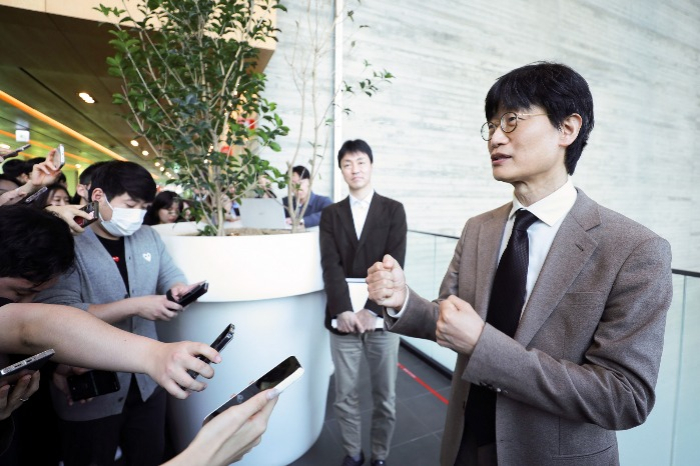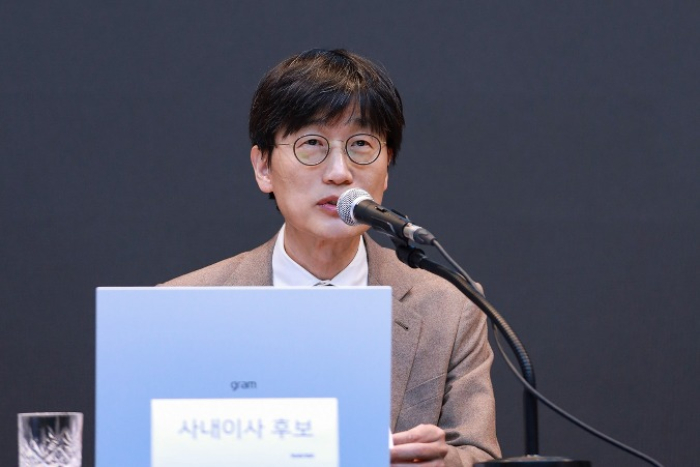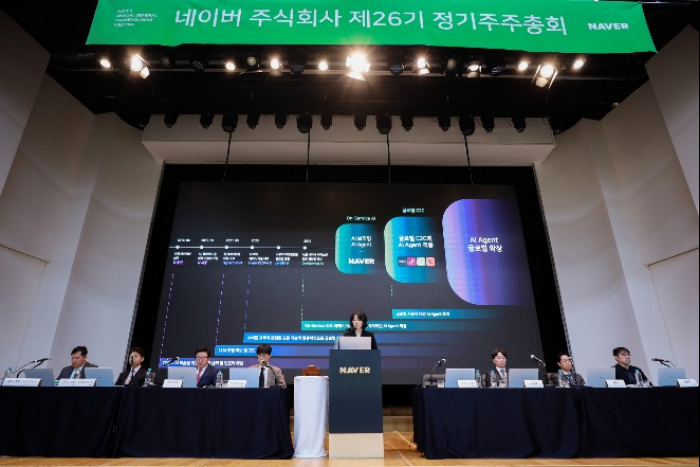
South Korea’s No. 1 internet portal operator Naver Corp. will build strong sovereign artificial intelligence to fight against the growing dominance of global Big Tech firms in the AI space, said its founder, who has returned as board chair eight years after his departure.
“We will build Naver’s unique AI service by turning obstacles into opportunities,” Lee Hae-jin, Naver’s board chair and founder, told reporters on Wednesday after the company’s annual shareholders’ meeting, where his board chairmanship was reinstated by shareholders’ votes.
Earlier last month, Naver’s board approved Lee’s comeback as board chair.
“We will continue to protect diversity with our proprietary technology, just as we have done for the past 25 years in the face of the dominant big techs like Google,” said Lee, underscoring Naver’s determination to reorganize its business centering around AI after the global AI race has entered a new chapter following DeepSeek’s arrival.
Lee stressed the importance of AI innovation, which he will lead as board chair to make Naver competitive in the global AI race.
“Many companies are poised to change everything with generative AI, the new big step in technology,” said Lee. “This also creates new challenges for Naver.”

To focus on Naver’s strategic direction, Lee has quit his job as Naver’s global investment officer (GIO).
The chair left the board in 2017 and stepped down from the company’s registered director a year later. Since then, he had focused on the company’s global business as GIO.
NAVER’S PROPRIETARY AI STILL LAGS
Naver unveiled the upgraded generative AI model HyperCLOVA X in August 2023, but the model’s performance has remained unimpressive compared to its bigger global rival, such as OpenAI’s sensational ChatGPT.
Even though the portal giant has upped the ante in the AI race by designating AI as its next growth driver, its AI business has made only a trivial contribution to Naver.
Last year, its annual revenue exceeded 10 trillion won ($6.8 billion) for the first time since its inception in 1999, and its search platform and commerce divisions led the growth, accounting for 64% of its total revenue.
Under Lee’s direction, Naver is expected to focus on advancement in sovereign AI, which refers to nations’ capabilities to produce artificial intelligence that tailors to their unique values, regulations and interests to understand different cultural and historical contexts.
It is considered crucial in an era where AI tends to give standardized answers to people’s questions as if they are the “right” answers.

As part of its efforts to enhance its AI capability, Naver will continue looking into chances to collaborate with Big Tech firms like Nvidia Corp., said Lee.
In May last year, Lee took part in The AI Seoul Summit and met Nvidia CEO Jensen Huang a month later, when the two leaders agreed to work closely together to develop sovereign AI models.
For the development of an indigenous AI model, Naver will accelerate the implementation of On-Service AI, designed to integrate its AI technology into its core services, including the search platform and shopping applications, this year.
As part of it, Naver will start servicing the so-called AI Briefing with diverse content summarization and recommendation features.
Naver CEO Choi Soo-yeon, who was approved to serve for her second term at the annual general shareholders’ meeting, vowed to adopt AI agents across Naver’s all services in the mid to long term to provide its users with the most optimized and customized services that can meet diverse demands.
With its native AI agent, Naver plans to go global, added Choi.
By Jeong-Hoon An
Ajh6321@hankyung.com
Sookyung Seo edited this article.














